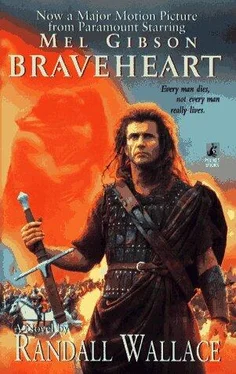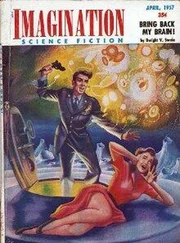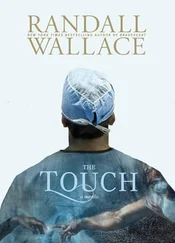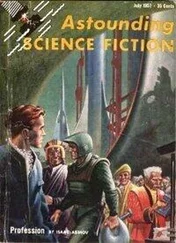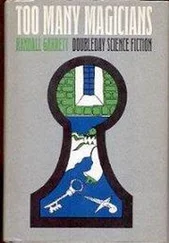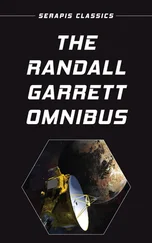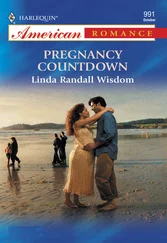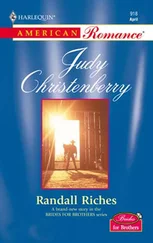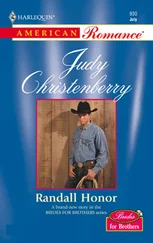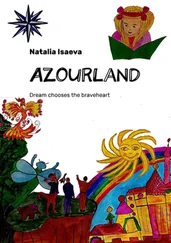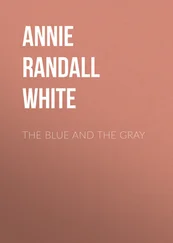In her arms he had lost all sense of danger, all sense of anything but her. And as much as he needed now to hurry, he stopped and turned to her and touched her face one last time.
He climbed out onto the ledge of the window. She touched his arm, and he lingered again. She had to ask him: “When we… did you think of her?”
He looked straight into her eyes and kissed her, not Murron—and climbed out.
She stood in the window and watched him all the way down the wall, across the heather, to the rill, until he was out of sight.
On his way back from the castle, William stopped at the secret grove where Murron lay. He remained there alone for many hours.
Night had fallen when he reached the cave and found Hamish and Stephen huddled by the fire, drinking whisky. They watched as he tied his horse beside theirs and took his place at the fire. He said nothing.
“Scouting?” Hamish asked, though he knew where his friend had gone.
Still Wallace said nothing. Stephen offered him the jug, but Wallace shook his head and stared at the fire.
When the fire had burned to smoldering ash, and Hamish and Stephen lay asleep, Wallace still sat awake. Without sleep and without dreams.
When Hamish heard a rustling and opened his eyes to the chill gray light of dawn, he saw William saddling his horse. Hamish punched Stephen, who opened his bleary eyes and squinted painfully at the same sight. Instinctively both men lurched to their feet, staggering with their hangover.
“Too fookin’ early!” Stephen groaned.
“Tell it ta God,” Hamish mumbled.
“He ain’t up yet,” Stephen said.
Wallace mounted and rode off; Hamish and Stephen had to scramble to catch him.
THAT VERY AFTERNOON THEY ATTACKED AN ENGLISH TAXAtion post, though it was broad daylight and the post was guarded by a dozen soldiers. Only a few stood to fight; the rest ran in all directions, recognizing the figure who charged them as the unkillable Scottish terror, William Wallace.
With the post still flaming behind them, Wallace led them on toward the garrison where the tax collectors were headquartered, reaching it before any of the escaped soldiers could and burning it to the ground as well. William, Hamish, and Stephen had more help than they needed; the villagers, when they saw Wallace riding past, his blond hair flying and his broad-sword bright with blood, dropped what they were doing and ran to follow him.
They attacked for two days without sleep, zigzagging through the countryside, striking out at everything that represented Longshanks and his royal domination. On the second night Hamish and Stephen convinced William to steal a few hours sleep in the wool shed of a farmer they had known for many years, a clansman who had fought beside them at Stirling. But again William was up before the dawn, seeking more royal soldiers to attack and drive from his country.
They camped in the forest that night, bone weary, eating the few bits of bread and dried meat the farmer had been able to spare them. And once again, Wallace sat staring at the fire.
“Rest, William,” Hamish pleaded.
“I rest,” William said.
“Your rest is making me exhausted.”
Stephen offered the jug; Wallace shook his head. “Come,” Stephen urged, “it’ll help you sleep.”
“Aye. But it won’t let me dream,” William said.
He pulled a tattered tartan around himself and lay down.
THAT SAME NIGHT LONGSHANKS SAT BY A PALACE HEARTH, where a huge blaze burned. Still he was huddled beneath a blanket, and he coughed blood. But he ignored the ice in his lungs; his mind was plotting.
The princess walked her parapets alone, lost in her own thoughts.
Wallace lay in the forest, dreamless beneath the stars.
And Robert the Bruce climbed reluctantly to the uppermost room of his father’s castle, summoned by a servant who said it was the old man’s urgent request that he come. Robert reached the door, found it unlocked, and entered without waiting. Moving into the suffocating darkness, heavy with his reluctance to be there, Robert took his seat across from his father, already at the table. The single candle burned between them, and in its light young Bruce saw that his father was cloaked more heavily than before. “You wished to see me, Father?”
“Yes. We both did.”
Robert heard a movement behind him and spun around to see Craig, leader of the Scottish council, standing against the wall behind Robert. Young Bruce was surprised to see that his father had revealed his disease to the old noble.
“Yes, I’ve shown him,” the elder Bruce said. “I’m dying anyway, no use to hide. But Longshanks, too, is failing. We are becoming the past—as you become the future.” The leper, feeling the weight of his infirmity—or was it the weight of something else? –sagged back and looked to Craig, who shifted forward, but only a half step; clearly he did not wish to be too close.
“Our nobles are frightened and confused,” Craig said. “Wallace has the commoners stirred up again, from the Highland clans to the Lowland villages. In another six months Christ and the Apostles could not govern this country.”
Robert glanced to his father; it was clear to the younger Bruce that his father had already been discussing something with Craig, and the two ancient noblemen, veterans of many decades of politics together, had agreed on something, something Craig was about to present.
But Craig was working up to it gradually. “Longshanks knows his son will scarcely be able to rule England, much less half of France. He needs Scotland settled, and he trusts you, after Falkirk. If you pay him homage, he will recognize you as king of Scotland. Our nobles have agreed to this as well.”
From within his woolen wrap, he withdrew and extended a parchment bearing the noblest names in Scotland. Young Bruce barely glanced at it and said, “If I pay homage to another’s throne, then how am I a king?”
“Homage is nothing!” Craig said impatiently. “It is the crown that matters!”
But young Bruce was intense with new clarity and the strength that came with it. “The crown is that of Scotland,” he said. “And Scotland is William Wallace.”
“Yes,” Craig said, glancing at the elder Bruce, “that is another matter. For something else is required before all this can take lace. You and William Wallace must meet. And make peace.”
Robert was surprised. He looked to his father, who said, without lifting his cloudy eyes back at him, “Yes. At last I have seen that this is the way for both of you to have what you want.”
IN LANARK, WHERE IT ALL BEGAN, THE VILLAGERS PAUSED their baking and hammering and watched as three of Scotland’s elder nobles, among them Craig, rode past their cottages. In the village square, on the very spot Murron was killed, the nobles stopped, and Craig announced, “We seek an audience with Wallace!”
The elders paused, staring around at the villagers, who had adopted fixed expressions that tried to say, “We have no idea who Wallace is or why you look for him among us.”
Craig expected such a response. “We will wait beyond the village, at the edge of the loch!” Craig called out. “We will go to him however he wishes us to go!”
Craig and his comrades rode slowly past the silent villagers.
The half moon had risen into a clear, star-dazzled sky above the Scottish forest. In the hidden encampment where Wallace and a corps of his staunchest followers were planning the next raid, there was a commotion; the sentries had spotted the approach of a cluster of men and silently spread the alarm. Wallace and all the others were waiting with drawn swords as the nobles, their heads hooded, were led in on horseback by loyalists from the village. When Wallace stepped out from behind the trees, the nobles were stopped and their hoods pulled off. Nervously they glanced about them.
Читать дальше
